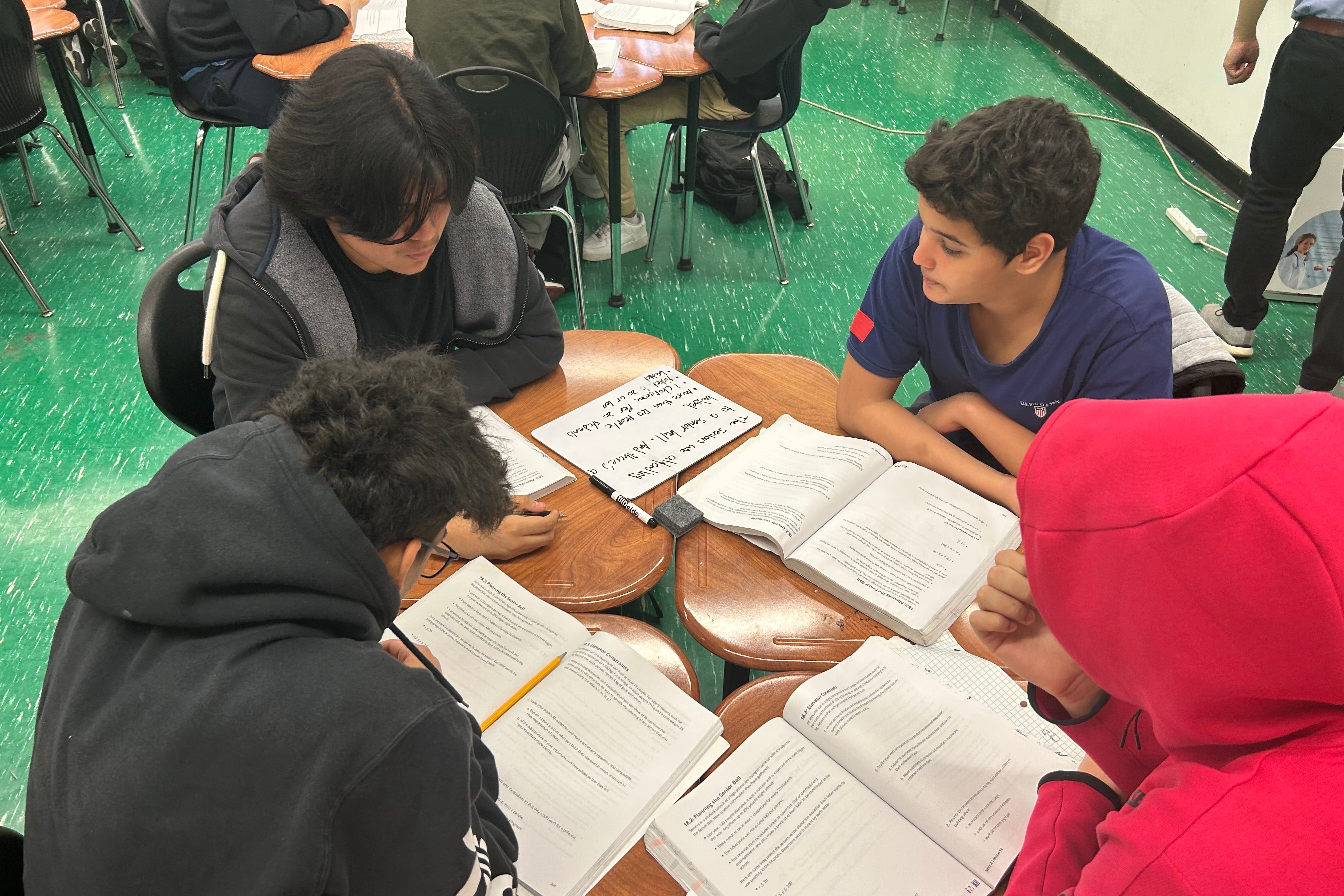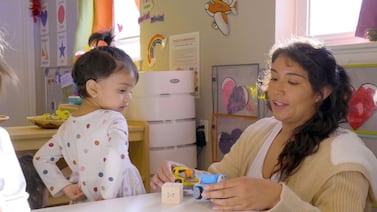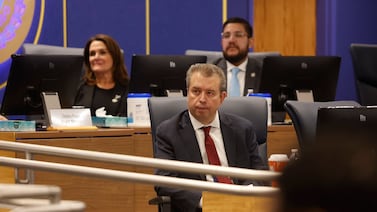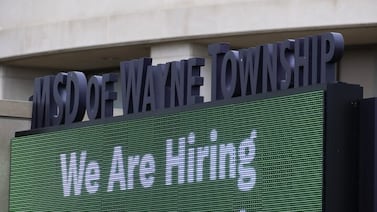Sign up for Chalkbeat New York’s free daily newsletter to keep up with NYC’s public schools.
New York City’s sweeping effort to overhaul algebra instruction with a new curriculum mandate will exempt some campuses — all of which are specialized high schools, officials confirmed this week.
By next fall, 420 city high schools will be required to use a curriculum called Imagine Learning Illustrative Math for Algebra 1, part of an effort to address plummeting math achievement in the wake of the pandemic.
The Education Department has granted just six exemptions to that mandate, all of them specialized high schools that admit students on the basis of a single standardized test.
Those six schools are: Stuyvesant High School, Brooklyn Technical High School, Brooklyn Latin High School, High School for Math Science and Engineering at City College, Bronx High School of Science, and the High School of American Studies at Lehman College.
Officials said those campuses were allowed to opt out of the new curriculum “due to their strong academic outcomes and existing supports.” Most students at those schools take and pass Algebra 1 in middle school, officials added.
Meanwhile, 36 “consortium” high schools — which are exempt from the state Regents exams and use capstone projects to assess student performance — will not be required to adopt new curriculum materials until the 2025-26 school year. They will have additional curriculum choices beyond Illustrative Math, said Education Department spokesperson Nicole Brownstein. District 75 schools, which serve students with more complex disabilities, will also have more time to implement a new math curriculum.
Math overhaul part of wider instructional changes
Schools Chancellor David Banks has made overhauling classroom materials a centerpiece of his administration, most notably in elementary school reading. He has been reluctant to grant exceptions to those directives. Just one campus — a gifted and talented school in Brooklyn — has been allowed to sidestep the reading curriculum overhaul.
Many experts, advocacy groups, and the city’s teachers union have backed the curriculum changes, which allow for larger-scale teacher training and fewer disruptions for students who switch schools.
“I think very highly of Illustrative Math – it’s a really good curriculum, and so it generally makes a lot of sense for the [Education Department] to standardize,” said Maria Klawe, the president of Math for America, an organization that offers fellowships and training opportunities to New York City math teachers.
“The flip side of what I just said is that if a teacher or a school has made tremendous investment in developing curriculum that for whatever reason works well,” she added, “it makes sense to make exceptions.”
The move to exempt most specialized schools, widely perceived to be among the city’s most prestigious, has frustrated some math educators.
“If the [Illustrative Math] curriculum is that good, then shouldn’t all schools be required to use it without modification?” said Bobson Wong, a veteran math teacher at Bayside High School.
City officials began rolling out the Illustrative Math curriculum in 265 high schools during the 2023-24 school year, winning mixed reviews from educators. Unlike many standard math curriculums that focus on memorizing procedures and terms, Illustrative Math aims to foster deeper conceptual understanding of mathematical principles, often through real-world examples.
Some educators said the curriculum draws in students with rich classroom conversations and can engage children from a wide array of skill levels.
But others contend that without a solid foundation of math terms and procedures, the more open-ended lessons can leave students without the tools they need to successfully solve problems. Some teachers also worry that it is not closely aligned with the material that appears on state exams that students typically must pass to graduate high school.
Officials have not laid out any specific criteria for exempting schools from the Algebra 1 mandate; for the reading curriculum changes, the Education Department insisted those decisions are made purely on a case-by-case basis.
The Education Department did not say why only six of the city’s eight test-in specialized high schools were granted an exemption to the mandate, which appeared to stoke some confusion. At Staten Island Technical High School, officials were under the impression they did not have to implement the new curriculum.
“As far as I know from my district support team, we’re exempt as well,” Principal Mark Erlenwein wrote in an email. He added that only 31 of the school’s roughly 338 ninth graders took Algebra 1 this year.
Brownstein insisted the school was not granted an exemption.
Teachers await training info on the math curriculum shift
Gary Rubinstein, a math teacher at Stuyvesant High School, said his school’s exemption had little practical impact because virtually every incoming student has already passed Algebra 1. But he said he would be wary of efforts to require him to use a mandated curriculum in other subjects, a move city officials are considering.
“I would never use a canned curriculum with a pacing calendar” that dictates how long to spend on each unit, he said, noting that such a directive could make it difficult to cover certain topics effectively.
As the city moves to roll out new math materials, some educators said they’ve received little information about what training to expect. Among schools in the first phase of the rollout this past school year, officials previously said teachers should receive eight “intensive” training sessions from Illustrative Math as well as at least eight “job-embedded coaching sessions” per teacher.
City officials did not respond to a question about their training plans for the coming school year, as many schools in the second phase of the rollout are set to the program for the first time.
For his part, Wong said he’s reviewed the Illustrative Math curriculum and believes there’s plenty of useful material in it, and it jibes with his own approach. But he worries the new mandates could be too rigid, forcing him to discard lessons he’s honed over the years.
He also hasn’t heard much about the city’s plans to get teachers up to speed.
“I don’t expect anything to happen until two days before classes start, which is of course not enough time to learn how to use a new curriculum,” he said.
Alex Zimmerman is a reporter for Chalkbeat New York, covering NYC public schools. Contact Alex at azimmerman@chalkbeat.org.







